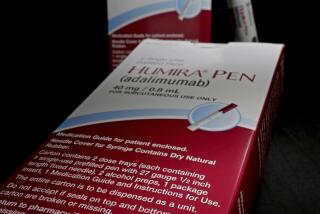Blockbuster-drug prices to drop as patents expire
- Share via
Some big-ticket medications are about to go generic, a shift that could save consumers billions--assuming they’re willing to give up a trusted brand name for an off-label replacement.
In the next two years, six of the 10 top-selling drugs will lose their patents, meaning other companies can make the medications and sell them at a huge discount, perhaps up to 80% off.
We’re talking some real blockbusters. Lipitor, the cholesterol-lowering medication that has long been the top-selling drug in the world, will lose its patent in November. When that patent expires, people will presumably be lining up to buy atorvastatin, the generic equivalent.
Other brand names that are about to take a hit include the anti-psychotic Zyprexa (the patent will expire in October), the popular and heavily advertised blood thinner Plavix (in May of next year) and the rheumatoid arthritis and psoriasis drug Enbrel (in October of next year).
All of these upcoming generics will renew a debate that has been going on for years: Are generic drugs just as good as the brand names that they replace? According to the FDA, generic drugs have the same “high quality, strength, purity and stability as brand-name drugs.” A study to be published in next month’s issue of International Angiology found that generic atorvastatin worked just as well as Lipitor.
But just like brand-name drugs, generics have an uneven safety record. In 2008, Baxter Healthcare recalled its version of heparin, a generic blood thinner, after it was found to be contaminated. Eighty-one people in the U.S. and Germany died after taking the tainted medication, although it’s unclear how many deaths were related to the drug.
And despite the reassurances from the FDA, studies have found that some generics don’t act in exactly the same way as the brand-name drugs, which can be a problem for drugs that operate on a thin margin for error. In April, researchers at Johns Hopkins University reported in the Annals of Neurology that there’s a roughly 10% chance that switching from a brand name to a generic anti-epilepsy drug would change the peak concentration that the drug reaches in the body. Put more simply: Price may not be the only difference between a brand name and a generic drug.
Because of a Supreme Court ruling in June, you won’t be able to sue makers of prescription drugs for complications or side effects that aren’t listed on the label.
If your doctor suggests switching to a generic, you can take it with confidence--but also with caution. Generics may be cheap, but they’re serious medicine.
RELATED: More news from HealthKey
More to Read
Inside the business of entertainment
The Wide Shot brings you news, analysis and insights on everything from streaming wars to production — and what it all means for the future.
You may occasionally receive promotional content from the Los Angeles Times.










